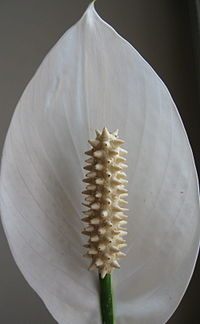Spathiphyllum wallisii
| Spathiphyllum wallisii subsp. var. | Peace Lily, White sails, Spathe flower | |||||||||||||||||||||||||||||||||||||||||||||||||||||||
|---|---|---|---|---|---|---|---|---|---|---|---|---|---|---|---|---|---|---|---|---|---|---|---|---|---|---|---|---|---|---|---|---|---|---|---|---|---|---|---|---|---|---|---|---|---|---|---|---|---|---|---|---|---|---|---|---|

|
|
| ||||||||||||||||||||||||||||||||||||||||||||||||||||||
| ||||||||||||||||||||||||||||||||||||||||||||||||||||||||
Spathiphyllum wallisii, commonly known as Peace lily, White sails, or spathe flower is a very popular indoor house plant of the family Araceae. The genus name means "spathe-leaf," and the specific epithet is named after Gustav Wallis, the German plant collector.
It is a caespitose herbaceous perennial. It produces typical Aroid flowers: a densely crowded inflorescence called a spadix is subtended by one large bract called a spathe (occasionally two spathes are produced, with the upper spathe smaller). The spadix is generally cream or ivory when young, and turns green with age; the spathe is generally white or white with green nerves distally from the margin, turning green with age. Leaves are basal, glossy and somewhat deeply veined, ovate and acuminate. The petioles are long and the leaves arch gracefully. The plant produces offsets at the base and becomes a dense clump in time.
Spathiphyllum wallisii is one of thirty six species in a genus of tropical evergreens. It was discovered in the late 19th century growing wild in Central America.
Cultivation
Propagation
Pests and diseases
Varieties
A number of cultivars, many of hybrid origin, are commercially available, such as the larger hybrids "Mauna Loa”, named after Hawaiian volcano, and the even larger “Sensation”, which are both popular indoor plants. "Domino" is a finely variegated variety of intermediate size.
Gallery
References
External links
- w:Spathiphyllum wallisii. Some of the material on this page may be from Wikipedia, under the Creative Commons license.
- Spathiphyllum wallisii QR Code (Size 50, 100, 200, 500)

